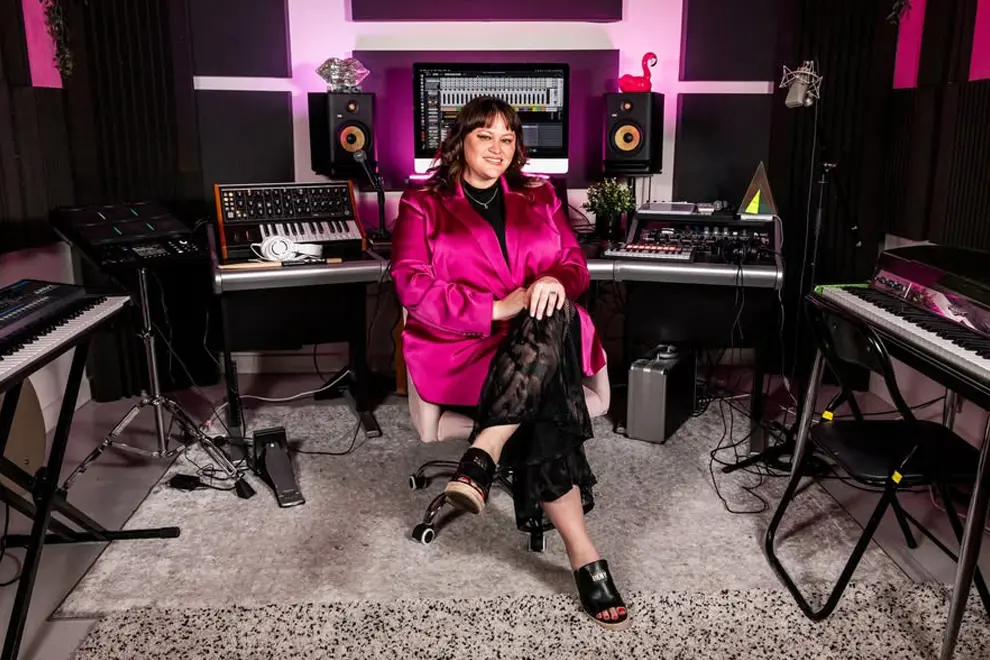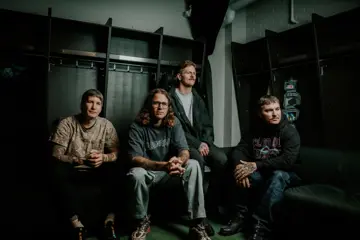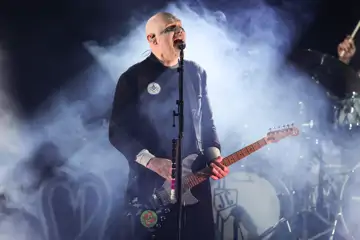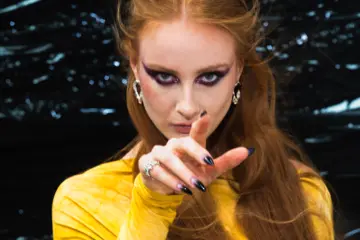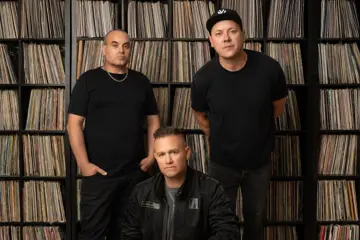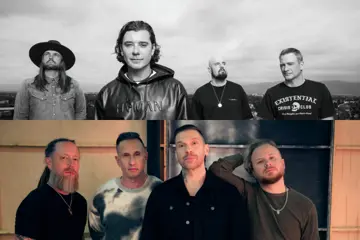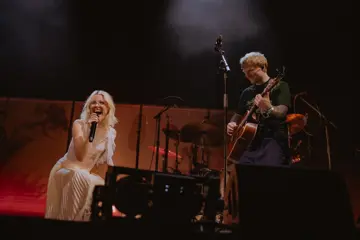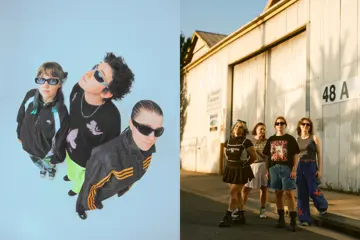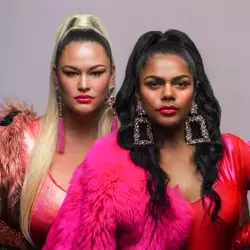 The Merindas
The MerindasWhen it comes to professionals in the Australian music industry who are kicking goals at every level, it's a little hard to go past the likes of Candice Lorrae.
To most, Lorrae's name is likely known due to her role as one half of pop duo The Merindas alongside Kristel Kickett, though her career is far more than that.
Additionally, Lorrae is also a storied songwriter, mentor, and producer, with the launch of her own Candy Suite Studio in 2024 helping to further achieve her goals as a multihyphenate in the Australian music scene.
But for Lorrae, who is herself a Jawoyn and Torres Strait Islander woman, her main focus is to amplify the voices of First Nations artists – specifically women – in music production.
Having recently also been awarded the Creative Australia First Nations Fellowship to aid her in these goals, we took the opportunity to speak to Lorrae about her illustrious career and how she uses her position to keep striving for new heights while also fostering and mentoring new talent.
Lorrae's love of music first began at a very young age, with Yothu Yindi being cited as one of her biggest influences as a young Darwin girl. "Just seeing how they brought the community together, and how there was this beautiful celebration of culture, music, and dance… I just remember how it made me feel," she recalls.
Don't miss a beat with our FREE daily newsletter
By the time that she was seven, she'd decided that being a singer was in her future, with none other than the late, great Whitney Houston helping to cement this dream after she discovered a copy of The Bodyguard soundtrack while on a drive from Darwin to Perth.
Even as she continued through school, the dream of music never once wavered. "Teachers would ask us questions like, 'What do you want to be when you grow up?' And I just always said 'a singer' – it never changed."
When it comes to the public-facing side of her music career, Lorrae first entered the studio at the age of 14 with Audius Mtawarira (whose discography includes collaborations with Delta Goodrem, Jessica Mauboy, Shakaya, and more). "That really triggered an inspiration in music production for me, just seeing how music is made," she remembers.
Leaving school at 16 to attend WA's Abmusic college, she graduated with her diploma and went on to continue lecturing in the coming years. "I guess I was just really good at helping nurture other young, emerging First Nations artists at the time as well," she adds.
Ultimately working in that role for 12 years, Lorrae found herself forming The Merindas following a request to have a girl group launch a premiere of The Sapphires in Perth in 2012. Working with Kickett, the response was a standing ovation, with the project quickly "snowballing" from there.
"We had calls from different venues wanting to book us, we did sell-out shows" she recalls. "The Merindas started as a Motown tribute band for six years, and there were a few different members towards the end before it ended up with just me and Kristel, but we decided we wanted to write originals and I wanted to start producing.
"At that time, I feel like things started to get a bit real, so I had to do the heartbreaking thing and leave my position at Abmusic after all those years of studying and teaching there. I had to sell everything, pack my bags, and move to Melbourne to chase my dream and music with Kristel.
"We pretty much just packed a suitcase and got in her bomb car with no spare tire, and we just drove," she adds. "When we got there, we were just living together in a small space to just make this dream work. But we got gigs and we were able to live off of it, so coming to Naarm was one of the best decisions I've ever made."
With The Merindas taking off, and Lorrae handling much of the production, she soon found herself being asked by friends to produce their own work.
"I started to take those jobs on, and at that time there was a real need for First Nations producers as well as female First Nations producers," she explains. "I realised there's been a lot of First Nations women that have been holding onto their stories and their songs for more than a decade and just haven't found the confidence or opportunity to record them.
"So I've been getting this wave of female artists now coming to me for the very purpose of knowing that I have this very safe space as a studio for First Nations women. I feel like they've been given that boost of confidence to come to me and work on these songs that they've been holding onto for so long."
This support and mentorship of First Nations artists has also come about through Lorrae's work with the Singing Our Futures program, which launched in 2021 with support from the Archie Roach Foundation.
The idea behind the program is to support emerging Indigenous artists by pairing them with celebrated mentors, including the likes of Emma Donovan, Emily Wurramara, DOBBY, Bumpy and more.
While some may view a mentoring role as a lofty task, Lorrae explains that it's an entirely natural thing for her. "It's soul food," she notes.
"It feeds my soul to know that we have these emerging First Nations artists that are being guided correctly, because when I was a young First Nations artist, there wasn't as much support around other than Abmusic.
"Going outside of that, it was really tough and there weren't really many programs or opportunities for young First Nations artists, so I feel like it's my duty to help make sure that there's something there for aspiring young First Nations artists – especially women," she adds.
"I ran into a lot of issues and a lot of sharks as an emerging artist, and I felt unsafe at times. I get really emotional when I just see artists grow, and seeing from when they start to years down the track and how they've blossomed."
That sense of mentoring also feeds into the launch of her Candy Suite Studio in 2024, which Lorrae envisions as a full-scale First Nations Music Hub designed by and for Indigenous artists. Alongside facilitating live rehearsals, production workshops, and supporting songwriting camps, its goals are certainly large, but they're admirable ones that align with Lorrae's vision.
"All the women that I work with in the space and that I'm training in music production, I say to them, 'This is your space. I know it's The Candy Suite, but this is your space,'" she explains. "I want this space to inspire all the women to create their own studios at home, and to be inspired to create their own space because it's not about one space, it's about many spaces.
"My vision is to hopefully see many First Nations and female-led music studios. Canisha, one of my mentees at the moment, and she's already setting up a home studio. She's on top of the gear, she's getting the funding, and I'm helping her set up her home studio while at the same time she's coming into Candy Suite and just using the equipment to build her skills.
"It's a collective of women at this moment that I've pinpointed that want to do music production," she adds. "There's no time timetable, it's just a case of 'when you're free, pop in.'"
While the likes of Canisha are examples of Lorrae's hard work and mentoring paying off and transferring onto other like-minded music producers, there's been plenty of wins coming out of The Candy Suite.
"We've just recorded the Aboriginal And Torres Strait Islander Songbook with Jessie Lloyd," she lists. "We've worked on a ten-track album with Lilly Gogos, we're working on an EP with Berniece [Peeauakeau] from the Sugar Cane Mamas, and I've got Georgia Corowa coming down soon as well."
Analogous to her work, Lorrae was also recently named as a recipient of the Creative Australia First Nations Fellowship which will help her to continue to mentor First Nations female producers. Alongside deepening her industry impact, these next two years will see her continuing to amplify the voices of women in music production.
"I was so lucky to get this award because I'd been self-funding the studio space since March 2024, and financially it was really tough and I was getting ready to shut it down by the end of last year," she admits. "But we got the grant in October, so it meant that it allowed for the continuation of this space and training of First Nations women in music production.
"This would not be going ahead if it wasn't for that award, so it means so much that we can continue this dream to build these women and to have the space to grow. This is just a seed to the bigger vision of a First Nations music hub, which I'm working on now. Hopefully, it will be a place for all mob to come together, to record, to collaborate, and for programs like Singing Our Futures to run.
"It provides me the opportunity to support and help others, and I feel it's really enriching lives," she continues. The work that I've done in this space this year, it's allowed me to create change."
As the Victorian Music Development Office (VMDO) succinctly noted in their own profile of Lorrae recently, she's "not only producing music – she is producing change," and that couldn't be more accurate.
With so many successes in her career, and with so many more still to come, we take a moment to reflect on legacy. As someone supporting First Nations artists at every turn, what would Lorrae want to be remembered for decades down the line?
"I think I'd say that my legacy is everything I do in music during the time I’m here on this earth," she explains. "From my work as an artist, a music producer, a mentor, and someone who built a supportive foundation for First Nations music."
In partnership with the Victorian Music Development Office


